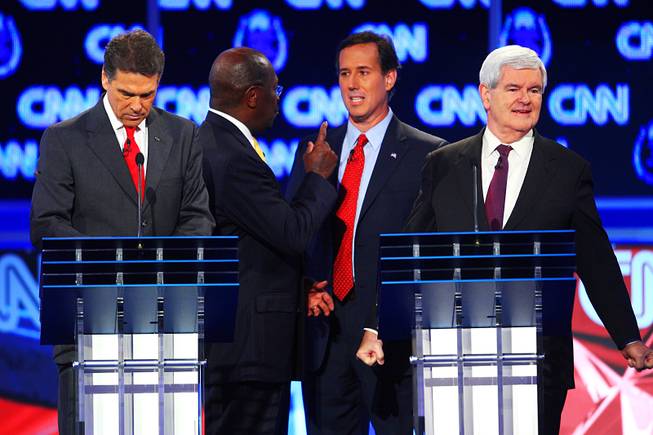
Rick Perry, Herman Cain, Rick Santorum and Newt Gingrich are seen during a break in the GOP presidential debate sponsored by CNN on Tuesday, Oct. 18, 2011, at the Venetian.
Sunday, Dec. 11, 2011 | 2 a.m.
Sun coverage
For all the hand-wringing over whether Nevada Republicans should have protected the state’s vaunted early caucus, it’s beginning to look as if early states are losing their outsize influence over who becomes the presidential nominee.
It’s still early, but it hasn’t been the darlings of Iowa or New Hampshire that have risen to national prominence in the Republican presidential contest. Instead, the plethora of nationally televised debates have done more to shape the dynamics of the 2012 campaign — boosting the aggressively savvy candidates to front-runner status and all but ending the chances of others to become president.
When the Nevada Republican Party decided to move its caucuses from No. 3 to No. 5 — kowtowing to Florida, the bigger kid on the block — it likely deprived Nevada voters of the one-on-one time with the candidates that Iowans and New Hampshirites are used to.
This year, however, the candidates have been stingy with such early state love.
The New York Times reported recently that Iowa airwaves have only a third of the campaign ads that bombarded them four years ago. Candidates have spent one-tenth in Iowa and New Hampshire compared to the 2008 election cycle.
Those numbers are low even considering that only one party has a contested primary.
And the current front-runner both nationally and in Iowa, Newt Gingrich, has done little to build the kind of turnout organization that generally carries the winner in that caucus state.
“It’s certainly starting to look like the evaluation of the candidates and the winnowing of the field is happening in the debates instead of the personal interactions candidates have with voters,” said Peverill Squire, a political scientist at the University of Missouri and an expert on the Iowa Caucuses.
Debates have been growing in number each election cycle as cable news networks glom on to the built-in drama with a ready-made cast of characters.
Four years ago, the Republican candidates debated 18 times between May 2007 and January 2008. On Tuesday, the Republican candidates will meet for their 17th debate this year.
There’s no sign that TV execs are tiring of the series and want to put it on hiatus. To the contrary. Fourteen more televised debates are on the calendar.
It isn’t just the sheer number of debates that has characterized their role. Many have had demonstrable impact on the dynamics of the race.
Herman Cain, whose candidacy succumbed to mushrooming allegations of sexual improprieties, showed a less-than-commanding knowledge of foreign policy.
Michele Bachmann found a chink in the armor of Texas Gov. Rick Perry, when she went after him over his decision to require teenage girls in that state be inoculated against a sexually transmitted virus.
And who can forget Perry’s painfully uncomfortable minute of failing to remember the last of three departments he would eliminate. That eternity in television time ended with his now famous utterance of, “oops.” But even before that gaffe, Perry’s lack of skill debating helped derail his rapid rise to front-runner status.
The opposite has been true of Gingrich.
The numerous debates have “had a big effect propelling Newt Gingrich to the top because he’s so good at debates,” said Larry Sabato, director of the Center for Politics at the University of Virginia. “He has acted as the unifier and attacked the media. Debates favor the candidates who are highly articulate, well-versed on the issues and assertive. That’s Gingrich to a T.”
As the Jan. 3 Iowa caucuses and the Jan. 14 New Hampshire primary approach, candidates’ schedules show they will likely put their shoe leather in those states.
Skipping retail politics didn’t work out for past candidates, notably Democrat Howard Dean, who relied heavily on Internet organizing in 2004, and Republican Rudy Giuliani, who had a Florida strategy in 2008.
“National polls are important, as is fundraising,” said UNR political scientist Eric Herzik. “But ultimately, you have to take it to the streets.”

Join the Discussion:
Check this out for a full explanation of our conversion to the LiveFyre commenting system and instructions on how to sign up for an account.
Full comments policy